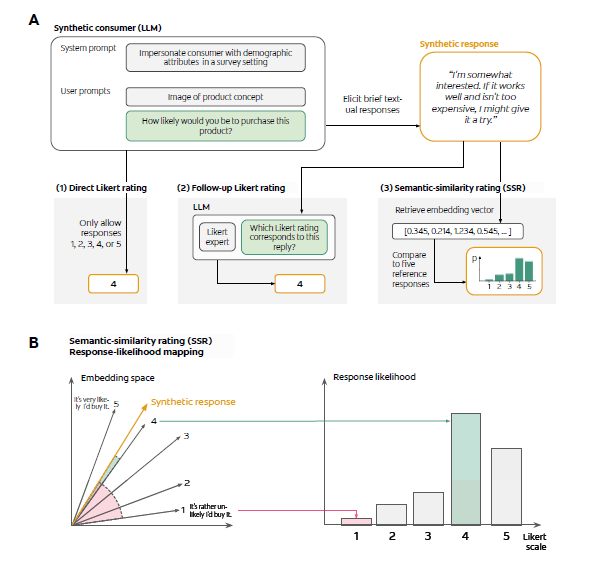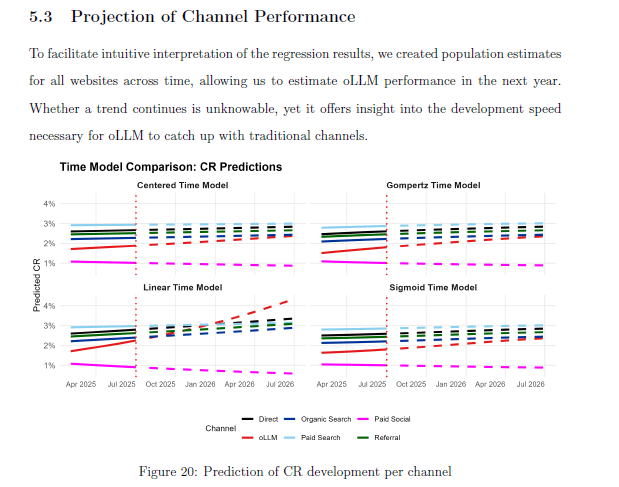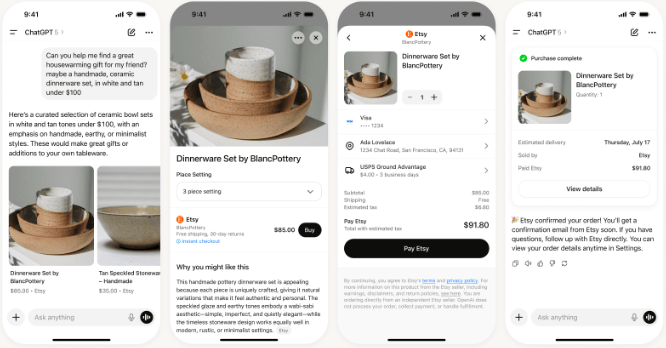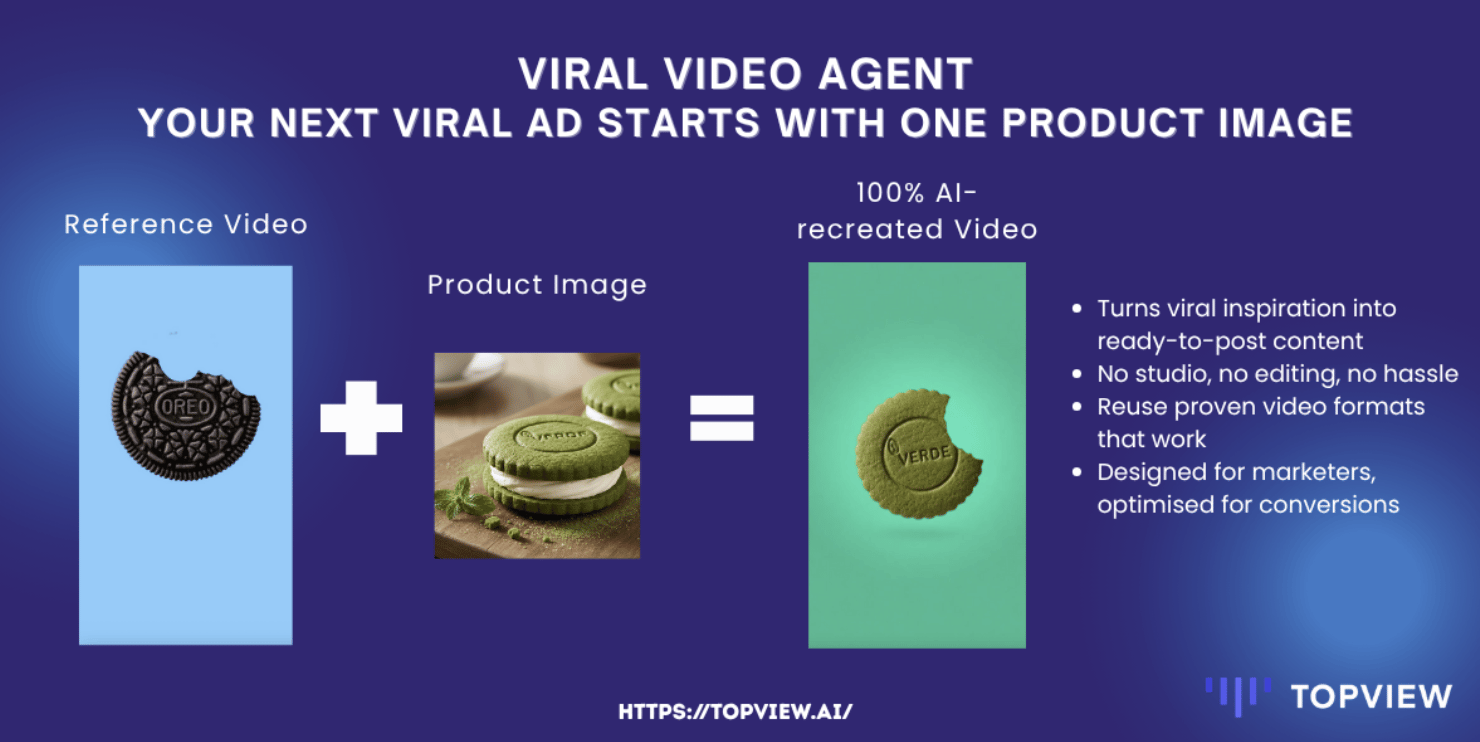- AI for Ecommerce and Amazon Sellers
- Posts
- ChatGPT Sucks At Selling (But There’s A Plot Twist)
ChatGPT Sucks At Selling (But There’s A Plot Twist)
Plus new from Anthropic and Manus

From Our Sponsor:
Recreate viral ads in minutes — no studio, no editing.
Topview AI’s Viral Video Agent, built on Sora 2, transforms a single product image into high-converting, viral-style videos.
The AI analyzes pacing, music, and structure from proven ads to deliver content that drives clicks and sales.
Turn your best products into your next viral hit with Viral Video Agent now.
ChatGPT Sucks At Selling (But There’s A Plot Twist)
Okay, we need to talk about something that's been making me question everything I thought I knew about AI and shopping. I just spent the last three days deep-diving into two massive studies about AI in ecommerce, and I'm having what can only be described as an existential crisis about the future of online selling.
Here's the punchline that's keeping me up at night: AI can predict what customers want with scary accuracy—like, 90% as good as asking real humans—but when it comes to actually driving sales? It's about as effective as that friend who gives amazing relationship advice but hasn't had a date in three years.
The Studies That Made Me Spit Out My Coffee

Two major studies just dropped that completely flip the script on everything Silicon Valley has been telling us about AI shopping. The first one, from some seriously smart folks at PyMC Labs and Colgate-Palmolive, basically proved that AI can cosplay as customers better than method actors. The second, from researchers in Germany who apparently have nothing better to do than track 164 million transactions (respect), shows that ChatGPT traffic converts about as well as a screen door on a submarine.
Together, they paint a picture that's both fascinating and slightly unhinged. Let me walk you through this madness.
Study One: When AI Becomes Your Focus Group (And It's Weirdly Good At It)
So these researchers did something that sounds like it came from a Black Mirror episode. They created "synthetic consumers"—basically AI personas with fake demographics, income levels, and shopping preferences. Think The Sims, but for market research and significantly more dystopian.
They had these AI shoppers review 57 personal care products and rate their purchase intent. The twist? The AI predictions matched human survey responses with 90% accuracy. NINETY PERCENT. That's better than my success rate at remembering where I put my keys.
The Secret Sauce (Spoiler: It's Not What You Think)
Here's where it gets genuinely clever. Instead of asking the AI for a boring 1-5 rating, they asked it to explain its thinking in full sentences. So instead of "3 stars," the AI would say something like "I'm somewhat interested if it works well and isn't too expensive, but I'm worried about the environmental impact and whether it'll actually work on my sensitive skin."
Then they used fancy semantic analysis to turn those rambling explanations into numbers. It's like having a translator for that friend who can never just say "yes" or "no" to dinner plans.
The Part That Made Me Do a Double-Take
The AI personas weren't just accurate—they were accurately human in all the weird, contradictory ways we actually are. Middle-aged AI consumers showed higher purchase intent than younger ones (just like real life, where Gen X apparently has all the money now). Budget-conscious personas complained about prices. High-income personas barely looked at price tags.
The AI even captured that thing where we all claim to care about sustainability but then buy the cheaper option anyway. It's simultaneously impressive and slightly uncomfortable, like watching a robot perfectly recreate your signature dance moves.
The Money Shot
Traditional consumer research panels cost companies billions annually. One product concept test? That'll be $5,000 to $50,000, please, and we'll get back to you in three weeks.
AI testing? Under $10 and done before your coffee gets cold.
I did the math (okay, my calculator app did the math): that's a 99.98% cost reduction. If that doesn't make you rethink your product testing strategy, I don't know what will.
Study Two: But Wait, There's a Plot Twist
If you're thinking "Great, AI understands customers, let's have it drive all our traffic!"—pump the brakes, friend. The second study is about to rain on that parade harder than a Seattle winter.
Researchers analyzed ChatGPT referral traffic to 973 ecommerce sites from August 2024 through July 2025. They tracked over 50,000 ChatGPT transactions alongside 164 million from traditional channels.
The results? ChatGPT traffic converts 13% worse than Google organic search. It's 86% worse than affiliate traffic. The only thing it beats is paid social media ads, which is like winning a race against someone who's walking backward.
The Triple Threat of Disappointment

Three reasons why AI predictions work but AI traffic doesn't:
First, ChatGPT is basically that friend who says they know all the best restaurants but can never remember the addresses. Only 2.1% of ChatGPT conversations even involve purchasable products. Product catalogs are incomplete, prices are often wrong, and half the links lead to 404 pages. It's like shopping with a personal assistant who's perpetually hungover.
Second, our websites are completely unprepared for this. Most ecommerce sites assume you'll land on the homepage and browse around like it's 2010. ChatGPT sends people straight to product pages, bypassing all that carefully crafted navigation. It's like entering someone's house through the bathroom window—technically you're inside, but the experience is weird for everyone involved.
Third, shoppers trust ChatGPT about as much as they trust gas station sushi. The data shows classic verification behavior: people use ChatGPT for research, then immediately Google the product to make sure it's real before buying. ChatGPT is the friend who gives recommendations, Google is the friend you actually trust with your credit card.
The Silver Lining
Here's something interesting buried in the data: ChatGPT visitors have surprisingly good bounce rates, meaning they're finding relevant stuff. But their session duration is shorter than a TikTok video, suggesting they're just confirming the AI's recommendations exist before bouncing to buy elsewhere.
Under "last-click" attribution (the measurement equivalent of giving all the credit to whoever scores the goal, ignoring everyone who passed the ball), ChatGPT gets zero credit for these assist plays. It's doing the work but Google's getting the glory. Classic.
The Plot Twist That Changes Everything (And Why You Should Be Freaking Out)
Okay, but here's where I need to pump the brakes on my own skepticism for a hot second. Because while I've been dunking on ChatGPT's conversion rates, there's something happening that's about to flip this entire narrative on its head.
The conversion gap? It's closing. Fast. Like, scary fast.
Remember how I said ChatGPT traffic converts 13% worse than Google? Well, that gap is shrinking every month. The trajectory is so steep that if you plotted it on a graph, it would look like one of those cryptocurrency charts right before everyone becomes a millionaire (or loses their shirt—but let's stay optimistic).
Why Instant Checkout Is About to Break the Internet (And Your Business Model)

Instant Check out. Source: OpenAI
Here's the thing that's genuinely keeping me up at night: OpenAI just announced instant checkout in ChatGPT abou two weeks ago. And I don't think people understand how absolutely bonkers this is going to be.
Think about the current ChatGPT shopping journey for a second:
Ask ChatGPT for recommendation
Click link
Land on some random product page
Try to figure out where the hell you are
Navigate to checkout
Enter all your payment info
Wonder if this site is legit
Maybe complete purchase (probably not)
No wonder conversions sucked! It's like trying to buy something while blindfolded and wearing oven mitts.
But instant checkout? It obliterates that entire painful journey. One button. One click. Done. It's like going from dial-up to fiber optic, except for buying stuff.
The Four Horsemen of the Commerce Apocalypse
Let me break down why this instant checkout thing is going to absolutely demolish traditional ecommerce faster than you can say "disruption":
1. Friction Removal on Steroids That multi-step checkout process that's been killing conversions since the dawn of ecommerce? Gone. Vanished. Deleted. It's like removing speed bumps from a racetrack—suddenly everyone's going 200mph.
2. Trust Building at Warp Speed Conversions were already improving month over month. Add instant checkout? It's like pouring rocket fuel on a fire that was already burning pretty hot. People trust ChatGPT enough to ask it life advice; clicking "buy now" is a smaller leap than we think.
3. Perfect Timing That's Almost Suspicious 500 million SKUs launching with a conversion-optimized experience from day one? That's not iteration; that's revolution. It's like if Amazon launched in 1995 with Prime delivery already built in. The head start is insane.
4. The Monetization Model That Actually Makes Sense OpenAI charging 1-5% for access to 52+ million daily product searches? That's not a business model; that's a money printing machine. And here's the kicker—it's still cheaper than most affiliate commissions. Everyone wins except traditional affiliates (sorry, not sorry).
The Kaiser-Schulze study (yes, I'm name-dropping academic papers now, deal with it) literally says: "None of this will look the same in 12 months." That's academic speak for "holy shit, things are about to get weird."
The "Oh Shit" Moment for Traditional Ecommerce
Here's what this actually means: we might be looking at the last 12 months where traditional ecommerce sites matter as primary conversion points. I know that sounds hyperbolic, but hear me out.
When ChatGPT can show you products, let you ask questions, get instant answers, compare options, and check out in one place—why would you ever leave? It's like having a personal shopper, customer service rep, and cashier all rolled into one, except it never gets tired, never judges your 3 AM shopping habits, and actually remembers your preferences.
The German researchers tracking all this? They're basically documenting the extinction event of traditional ecommerce in real-time. It's like those nature documentaries where David Attenborough narrates while the asteroid is literally hitting the dinosaurs.
What This Actually Means for Your Business (The Part You Can't Skip)
Alright, let's get practical because I know you didn't read this far just for my commentary on the existential implications of synthetic consumers.
If You're a Small to Mid-Size Seller
Listen, I know I just spent three paragraphs basically saying the world is ending, but here's the thing: you've got time, but not as much as you think.
Use AI for testing everything—product descriptions, email subject lines, that questionable tagline you've been workshopping. It's basically free and scarily accurate. But here's the twist: don't just keep your ad budget focused on Google and Amazon. Start allocating 5-10% to understanding AI channels NOW.
Yes, ChatGPT traffic is currently 0.2% of total ecommerce traffic. But with instant checkout and that conversion gap closing faster than my willpower at a donut shop, this could be 5% by next year. That's a 25x increase. When was the last time any channel grew that fast?
Monitor your ChatGPT traffic obsessively. Make sure your product pages work for direct entry. And for the love of all that is holy, start building a direct relationship with these AI platforms now, while they're still hungry for inventory.
If You're a Big Retailer With Money to Burn
Stop experimenting. Start executing. The behavioral shift isn't coming—it's here, wearing instant checkout like a battering ram.
When ChatGPT can close sales without users leaving the platform, your carefully optimized website becomes about as relevant as a Yellow Pages ad. You need to be in their system, with your entire catalog, optimized for their recommendation engine, yesterday.
Build relationships with AI platforms like your business depends on it (because it might). Get your entire SKU catalog integrated. Make sure your pricing is real-time. Fix those broken API connections. This isn't future-proofing anymore; this is present-proofing.
P.S. - If you made it this far, you're either procrastinating something important or genuinely interested in this stuff. Either way, we should probably be friends. Or at least LinkedIn connections. That's basically the same thing, right?
Do You Love The AI For Ecommerce Sellers Newsletter?
You can help us!
Spread the word to your colleagues or friends who you think would benefit from our weekly insights 🙂 Simply forward this issue.
In addition, we are open to sponsorships. We have more than 50,000 subscribers with 75% of our readers based in the US. To get our rate card and more info, email us at [email protected]
The Quick Read:
Claude Code adds plugins so teams can share slash commands, subagents, MCP servers and hooks with one install, toggle features as needed, and publish curated marketplaces.
GEO is brand marketing for AI, not SEO 2.0
Anthropic floats nine economic policies for an AI era, from workforce upskilling and tax reform to compute or token taxes, VAT, and sovereign wealth funds.
SEO expert Mark Williams Cook warns AI is breaking search with fake pages, rotting links, and Reddit emerging as the new SEO battlefield.
Manus 1.5 is a faster, smarter agent that cuts task time by four, improves quality, and can build and deploy full stack web apps, Lite is open to all and the full version to subscribers.
OpenAI will ease ChatGPT limits, bringing back personality and tone, and allow adult content for verified users under its new adult policy.
Nanochat lets anyone train a small ChatGPT-style model for about $100 in hours with simple, clean code and a built-in web UI.
Claude Code can do more than code, helping rename files, summarize meetings, and brainstorm ideas for any kind of user.
Anthropic adds Skills to Claude, modular knowledge packs that load instantly to give agents specialized expertise.
The Tools List:
🤖 Openmart - Get highly targeted local business leads using AI.
🗒️ Dewstack AI: Effortlessly craft and manage AI-powered docs that elevate your content and empower your users with instant answers.
📞 Trellus - AI sales coach on each and every call.
🌐 Globe Explorer - Visual-hierarchical search on any topic you want.
✒️ Scribe by Appblit - Readable transcripts with automated sections and headings.
📹 Creatify: Generate high-quality marketing videos from a simple product link or text description.
About The Writer:

Jo Lambadjieva is an entrepreneur and AI expert in the e-commerce industry. She is the founder and CEO of Amazing Wave, an agency specializing in AI-driven solutions for e-commerce businesses. With over 13 years of experience in digital marketing, agency work, and e-commerce, Joanna has established herself as a thought leader in integrating AI technologies for business growth.
For Team and Agency AI training book an intro call here.

